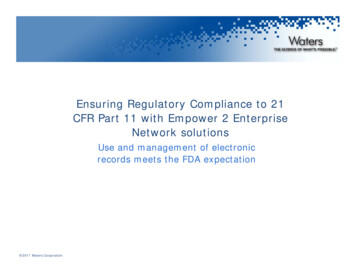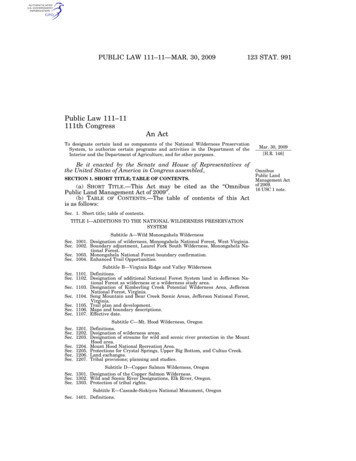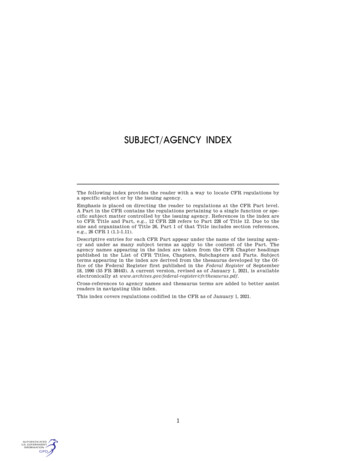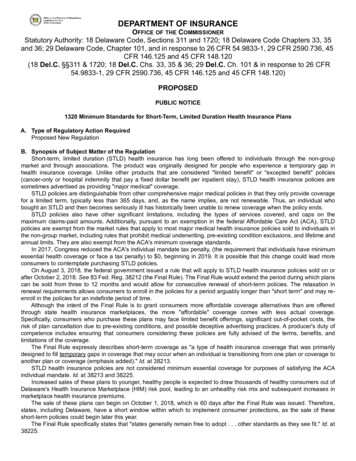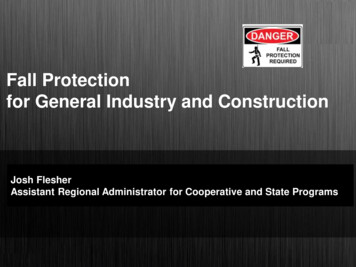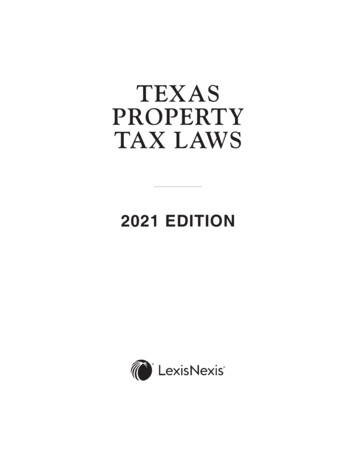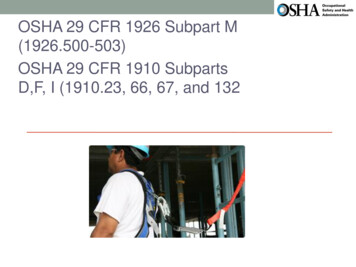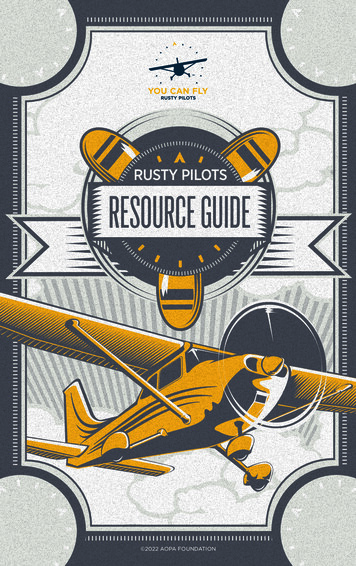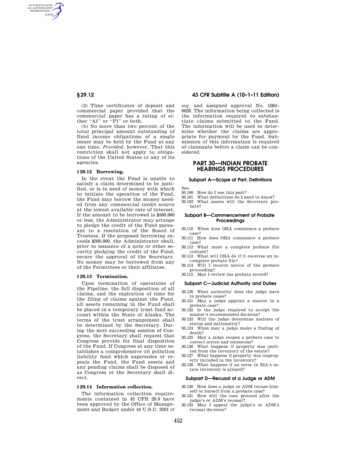
Transcription
§ 29.1243 CFR Subtitle A (10–1–11 Edition)(3) Time certificates of deposit andcommercial paper provided that thecommercial paper has a rating of either ‘‘A1’’ or ‘‘P1’’ or both.(b) No more than two percent of thetotal principal amount outstanding offixed income obligations of a singleissuer may be held by the Fund at anyone time, Provided, however, That thisrestriction shall not apply to obligations of the United States or any of itsagencies.§ 29.12 Borrowing.In the event the Fund is unable tosatisfy a claim determined to be justified, or is in need of money with whichto initiate the operation of the Fund,the Fund may borrow the money needed from any commercial credit sourceat the lowest available rate of interest.If the amount to be borrowed is 500,000or less, the Administrator may arrangeto pledge the credit of the Fund pursuant to a resolution of the Board ofTrustees. If the proposed borrowing exceeds 500,000, the Administrator shall,prior to issuance of a note or other security pledging the credit of the Fund,secure the approval of the Secretary.No money may be borrowed from anyof the Permittees or their affiliates.§ 29.13 Termination.Upon termination of operations ofthe Pipeline, the full disposition of allclaims, and the expiration of time forthe filing of claims against the Fund,all assets remaining in the Fund shallbe placed in a temporary trust fund account within the State of Alaska. Theterms of the trust arrangement shallbe determined by the Secretary. During the next succeeding session of Congress, the Secretary shall request thatCongress provide for final dispositionof the Fund. If Congress at any time establishes a comprehensive oil pollutionliability fund which supersedes or repeals the Fund, the Fund assets andany pending claims shall be disposed ofas Congress or the Secretary shall direct.§ 29.14 Information collection.The information collection requirements contained in 43 CFR 29.9 havebeen approved by the Office of Management and Budget under 44 U.S.C. 3501 etseq. and assigned approval No. 1084–0026. The information being collected isthe information required to substantiate claims submitted to the Fund.The information will be used to determine whether the claims are appropriate for payment by the Fund. Submission of this information is requiredof claimants before a claim can be considered.PART 30—INDIAN PROBATEHEARINGS PROCEDURESSubpart A—Scope of Part; DefinitionsSec.30.100 How do I use this part?30.101 What definitions do I need to know?30.102 What assets will the Secretary probate?Subpart B—Commencement of ProbateProceedings30.110 When does OHA commence a probatecase?30.111 How does OHA commence a probatecase?30.112 What must a complete probate filecontain?30.113 What will OHA do if it receives an incomplete probate file?30.114 Will I receive notice of the probateproceeding?30.115 May I review the probate record?Subpart C—Judicial Authority and Duties30.120 What authority does the judge havein probate cases?30.121 May a judge appoint a master in aprobate case?30.122 Is the judge required to accept themaster’s recommended decision?30.123 Will the judge determine matters ofstatus and nationality?30.124 When may a judge make a finding ofdeath?30.125 May a judge reopen a probate case tocorrect errors and omissions?30.126 What happens if property was omitted from the inventory of the estate?30.127 What happens if property was improperly included in the inventory?30.128 What happens if an error in BIA’s estate inventory is alleged?Subpart D—Recusal of a Judge or ADM30.130 How does a judge or ADM recuse himself or herself from a probate case?30.131 How will the case proceed after thejudge’s or ADM’s recusal?30.132 May I appeal the judge’s or ADM’srecusal decision?452VerDate Mar 15 201015:01 Nov 22, 2011Jkt 223186PO 00000Frm 00462Fmt 8010Sfmt 8010Q:\43\43V1.TXTofr150PsN: PC150
Office of the Secretary, InteriorPt. 3030.175 When does a purchased interest vestin the purchaser?Subpart E—Claims30.140 Where and when may I file a claimagainst the probate estate?30.141 How must I file a claim against a probate estate?30.142 Will a judge authorize payment of aclaim from the estate if the decedent’snon-trust property was or is available?30.143 Are there any categories of claimsthat will not be allowed?30.144 May the judge authorize payment ofthe costs of administering the estate?30.145 When can a judge reduce or disallow aclaim?30.146 What property is subject to claims?30.147 What happens if there is not enoughtrust personalty to pay all the claims?30.148 Will interest or penalties chargedafter the date of death be paid?Subpart F—Consolidation and SettlementAgreements30.150 What action will the judge take if theinterested parties agree to settle mattersamong themselves?30.151 May the devisees or eligible heirs in aprobate proceeding consolidate their interests?30.152 May the parties to an agreementwaive valuation of trust property?30.153 Is an order approving an agreementconsidered a partition or sale transaction?Subpart G—Purchase at Probate30.160 What may be purchased at probate?30.161 Who may purchase at probate?30.162 Does property purchased at probateremain in trust or restricted status?30.163 Is consent required for a purchase atprobate?30.164 What must I do to purchase at probate?30.165 Whom will OHA notify of a request topurchase at probate?30.166 What will the notice of the request topurchase at probate include?30.167 How does OHA decide whether to approve a purchase at probate?30.168 How will the judge allocate the proceeds from a sale?30.169 What may I do if I do not agree withthe appraised market value?30.170 What may I do if I disagree with thejudge’s determination to approve a purchase at probate?30.171 What happens when the judge grantsa request to purchase at probate?30.172 When must the successful bidder payfor the interest purchased?30.173 What happens after the successfulbidder submits payment?30.174 What happens if the successful bidderdoes not pay within 30 days?Subpart H—Renunciation of Interest30.180 May I give up an inherited interest intrust or restricted property or trust personalty?30.181 How do I renounce an inherited interest?30.182 Who may receive a renounced interest in trust or restricted land?30.183 Who may receive a renounced interest of less than 5 percent in trust or restricted land?30.184 Who may receive a renounced interest in trust personalty?30.185 May my designated recipient refuseto accept the interest?30.186 Are renunciations that predate theAmerican Indian Probate Reform Act of2004 valid?30.187 May I revoke my renunciation?30.188 Does a renounced interest vest in theperson who renounced it?Subpart I—Summary Probate Proceedings30.200 What is a summary probate proceeding?30.201 What does a notice of a summary probate proceeding contain?30.202 May I file a claim or renounce or disclaim an interest in the estate in a summary probate proceeding?30.203 May I request that a formal probateproceeding be conducted instead of asummary probate proceeding?30.204 What must a summary probate decision contain?30.205 How do I seek review of a summaryprobate proceeding?30.206 What happens after I file a request forde novo review?30.207 What happens if nobody files for denovo review?Subpart J—Formal Probate ProceedingsNOTICE30.210 How will I receive notice of the formal probate proceeding?30.211 Will the notice be published in anewspaper?30.212 May I waive notice of the hearing orthe form of notice?30.213 What notice to a tribe is required ina formal probate proceeding?30.214 What must a notice of hearing contain?DEPOSITIONS, DISCOVERY, AND PREHEARINGCONFERENCE30.215 How may I obtain documents relatedto the probate proceeding?30.216 How do I obtain permission to takedepositions?453VerDate Mar 15 201015:01 Nov 22, 2011Jkt 223186PO 00000Frm 00463Fmt 8010Sfmt 8010Q:\43\43V1.TXTofr150PsN: PC150
Pt. 3043 CFR Subtitle A (10–1–11 Edition)30.217 How is a deposition taken?30.218 How may the transcript of a deposition be used?30.219 Who pays for the costs of taking adeposition?30.220 How do I obtain written interrogatories and admission of facts and documents?30.221 May the judge limit the time, place,and scope of discovery?30.222 What happens if a party fails to comply with discovery?30.223 What is a prehearing conference?Subpart K—Miscellaneous Provisions30.250 When does the anti-lapse provisionapply?30.251 What happens if an heir or deviseeparticipates in the killing of the decedent?30.252 May a judge allow fees for attorneysrepresenting interested parties?30.253 How must minors or other legalincompetents be represented?30.254 What happens when a person dieswithout a valid will and has no heirs?Subpart L—Tribal Purchase of InterestsUnder Special StatutesHEARINGS30.224 May a judge compel a witness to appear and testify at a hearing or deposition?30.225 Must testimony in a probate proceeding be under oath or affirmation?30.226 Is a record made of formal probatehearings?30.227 What evidence is admissible at a probate hearing?30.228 Is testimony required for self-provedwills, codicils, or revocations?30.229 When will testimony be required forapproval of a will, codicil, or revocation?30.230 Who pays witnesses’ costs?30.231 May a judge schedule a supplementalhearing?30.232 What will the official record of theprobate case contain?30.233 What will the judge do with the original record?30.234 What happens if a hearing transcripthas not been prepared?DECISIONS IN FORMAL PROCEEDINGS30.235 What will the judge’s decision in aformal probate proceeding contain?30.236 How are covered permanent improvements treated?30.237 What notice of the decision will thejudge provide?30.238 May I file a petition for rehearing ifI disagree with the judge’s decision inthe formal probate hearing?30.239 Does any distribution of the estateoccur while a petition for rehearing ispending?30.240 How will the judge decide a petitionfor rehearing?30.241 May I submit another petition for rehearing?30.242 When does the judge’s decision on apetition for rehearing become final?30.243 May a closed probate case be reopened?30.244 How will the judge decide my petitionfor reopening?30.245 What happens if the judge reopens thecase?30.246 When will the decision on reopeningbecome final?30.260 What land is subject to a tribal purchase option at probate?30.261 How does a tribe exercise its statutory option to purchase?30.262 When may a tribe exercise its statutory option to purchase?30.263 May a surviving spouse reserve a lifeestate when a tribe exercises its statutory option to purchase?30.264 When must BIA furnish a valuation ofa decedent’s interests?30.265 What determinations will a judgemake with respect to a tribal purchaseoption?30.266 When is a final decision issued?30.267 What if I disagree with the probatedecision regarding tribal purchase option?30.268 May I demand a hearing regardingthe tribal purchase option decision?30.269 What notice of the hearing will thejudge provide?30.270 How will the hearing be conducted?30.271 How must the tribe pay for the interests it purchases?30.272 What are BIA’s duties on payment bythe tribe?30.273 What action will the judge take torecord title?30.274 What happens to income from landinterests during pendency of the probate?AUTHORITY: 5 U.S.C. 301, 503; 25 U.S.C. 9,372–74, 410, 2201 et seq.; 43 U.S.C. 1201, 1457.CROSS REFERENCE: For regulations pertaining to the processing of Indian probatematters within the Bureau of Indian Affairs,see 25 CFR part 15. For regulations pertaining to the appeal of decisions of the Probate Hearings Division, Office of Hearingsand Appeals, to the Board of Indian Appeals,Office of Hearings and Appeals, see 43 CFRpart 4, subpart D. For regulations generallyapplicable to proceedings before the Hearings Divisions and Appeal Boards of the Office of Hearings and Appeals, see 43 CFR part4, subpart B.SOURCE: 73 FR 67289, Nov. 13, 2008, unlessotherwise noted.454VerDate Mar 15 201015:01 Nov 22, 2011Jkt 223186PO 00000Frm 00464Fmt 8010Sfmt 8010Q:\43\43V1.TXTofr150PsN: PC150
Office of the Secretary, Interior§ 30.101Subpart A—Scope of Part;Definitions§ 30.100How do I use this part?(a) The following table is a guide tothe relevant contents of this part bysubject matter.For provisions relating to . . .consult . . .(1) All proceedings in part 30 .§§ 30.10030.102.§§ 30.14030.148.§§ 30.11030.115.§§ 30.15030.153.§§ 30.21030.246.(2) Claims against probate estate .(3) Commencement of probate .(4) Consolidation of interests .(5) Formal probate proceedings beforean administrative law judge or Indianprobate judge.(6) Probate of estates of Indians whodie possessed of trust or restrictedproperty.(7) Purchases at probate .(8) Renunciation of interests .(9) Summary probate proceedings before an attorney decision maker.(10) Tribal purchase of certain propertyinterests of decedents under speciallaws applicable to particular Tribes.throughthroughthroughthroughthroughAll sections except§§ 30.260through 30.274.§§ 30.160 through30.175.§§ 30.180 through30.188.§§ 30.200 through30.207.§§ 30.260 through30.274.(b) Except as limited by the provisions of this part, the regulations inpart 4, subparts A and B of this subtitleapply to these proceedings.(c) The following provisions do notapply to Alaska property interests:(1) § 30.151;(2) §§ 30.160 through 30.175;(3) § 30.182 through 30.185, except for§ 30.184(c);(4) § 30.213; and(5) § 30.214(f) and (g).[73 FR 67289, Nov. 13, 2008, as amended at 76FR 7506, Feb. 10, 2011]§ 30.101 What definitions do I need toknow?Act means the Indian Land Consolidation Act and its amendments, including the American Indian Probate Reform Act of 2004 (AIPRA), Public Law108–374, as codified at 25 U.S.C. 2201 etseq.Administrative law judge (ALJ) meansan administrative law judge with OHAappointed under the AdministrativeProcedure Act, 5 U.S.C. 3105.Affidavit means a written declarationof facts by a person that is signed bythat person, swearing or affirmingunder penalty of perjury that the factsdeclared are true and correct to thebest of that person’s knowledge and belief.Agency means:(1) The Bureau of Indian Affairs (BIA)agency office, or any other designatedoffice in BIA, having jurisdiction overtrust or restricted land and trust personalty; and(2) Any office of a tribe that has entered into a contract or compact to fulfill the probate function under 25U.S.C. 450f or 458cc.Attorney decision maker (ADM) meansan attorney with OHA who conducts asummary proceeding and renders a decision that is subject to de novo reviewby an administrative law judge or Indian probate judge.BIA means the Bureau of Indian Affairs within the Department.BLM means the Bureau of Land Management within the Department.Board means the Interior Board of Indian Appeals within OHA.Chief ALJ means the Chief Administrative Law Judge, Probate HearingsDivision, OHA.Child means a natural or adoptedchild.Codicil means a supplement or addition to a will, executed with the sameformalities as a will. It may explain,modify, add to, or revoke provisions inan existing will.Consolidation agreement means a written agreement under the provisions of25 U.S.C. 2206(e) or 2206(j)(9), enteredduring the probate process, approvedby the judge, and implemented by theprobate order, by which a decedent’sheirs and devisees consolidate interestsin trust or restricted land.Covered permanent improvement meansa permanent improvement (includingan interest in such an improvement)that is:(1) Owned by the decedent at thetime of death; and(2) Attached to a parcel of trust orrestricted land that is also, in whole orin part, owned by the decedent at thetime of death.Creditor means any individual or entity that has a claim for payment from adecedent’s estate.Day means a calendar day.455VerDate Mar 15 201015:01 Nov 22, 2011Jkt 223186PO 00000Frm 00465Fmt 8010Sfmt 8010Q:\43\43V1.TXTofr150PsN: PC150
§ 30.10143 CFR Subtitle A (10–1–11 Edition)Decedent means a person who is deceased.Decision or order (or decision andorder) means:(1) A written document issued by ajudge making determinations as toheirs, wills, devisees, and the claims ofcreditors, and ordering distribution oftrust or restricted land or trust personalty;(2) The decision issued by an ADM ina summary probate proceeding; or(3) A decision issued by a judge finding that the evidence is insufficient todetermine that a person is deceased byreason of unexplained absence.De novo review means a process inwhich an administrative law judge orIndian probate judge, without regard tothe decision previously issued in thecase, will:(1) Review all the relevant facts andissues in a probate case;(2) Reconsider the evidence introduced at a previous hearing;(3) Conduct a formal hearing as necessary or appropriate; and(4) Issue a decision.Department means the Department ofthe Interior.Deposition means a proceeding inwhich a party takes testimony from awitness during discovery.Devise means a gift of property bywill. Also, to give property by will.Devisee means a person or entity thatreceives property under a will.Discovery means a process throughwhich a party to a probate proceedingobtains information from anotherparty. Examples of discovery includeinterrogatories, depositions, requestsfor admission, and requests for production of documents.Eligible heir means, for the purposesof the Act, any of a decedent’s children, grandchildren, great grandchildren, full siblings, half siblings byblood, and parents who are:(1) Indian;(2) Lineal descendents within two degrees of consanguinity of an Indian; or(3) Owners of a trust or restricted interest in a parcel of land for purposesof inheriting—by descent, renunciation, or consolidation agreement—another trust or restricted interest insuch a parcel from the decedent.Estate means the trust or restrictedland and trust personalty owned by thedecedent at the time of death.Formal probate proceeding means aproceeding, conducted by a judge, inwhich evidence is obtained through thetestimony of witnesses and the receiptof relevant documents.Heir means any individual or entityeligible to receive property from a decedent in an intestate proceeding.Individual Indian Money (IIM) accountmeans an interest bearing account fortrust funds held by the Secretary thatbelong to a person who has an interestin trust assets. These accounts areunder the control and management ofthe Secretary.Indian means, for the purposes of theAct:(1) Any person who is a member of afederally recognized Indian tribe, is eligible to become a member of any federally recognized Indian tribe, or is anowner (as of October 27, 2004) of a trustor restricted interest in land;(2) Any person meeting the definitionof Indian under 25 U.S.C. 479; or(3) With respect to the inheritanceand ownership of trust or restrictedland in the State of California under 25U.S.C. 2206, any person described inparagraph (1) or (2) of this definition orany person who owns a trust or restricted interest in a parcel of suchland in that State.Indian probate judge (IPJ) means anattorney with OHA, other than an ALJ,to whom the Secretary has delegatedthe authority to hear and decide Indianprobate cases.Interested party means:(1) Any potential or actual heir;(2) Any devisee under a will;(3) Any person or entity asserting aclaim against a decedent’s estate;(4) Any tribe having a statutory option to purchase the trust or restrictedproperty interest of a decedent; or(5) Any co-owner exercising a purchase option.Interrogatories means written questions submitted to another party forresponses as part of discovery.Intestate means that the decedentdied without a valid will as determinedin the probate proceeding.Judge means an ALJ or IPJ.456VerDate Mar 15 201015:01 Nov 22, 2011Jkt 223186PO 00000Frm 00466Fmt 8010Sfmt 8010Q:\43\43V1.TXTofr150PsN: PC150
Office of the Secretary, Interior§ 30.102Lockbox means a centralized systemwithin OST for receiving and depositing trust fund remittances collectedby BIA.LTRO means the Land Titles andRecords Office within BIA.Master means a person who has beenspecially appointed by a judge to assistwith the probate proceedings.Minor means an individual who hasnot reached the age of majority as defined by the applicable law.OHA means the Office of Hearingsand Appeals within the Department.OST means the Office of the SpecialTrustee for American Indians withinthe Department.Per stirpes means by right of representation, dividing an estate intoequal shares based on the number ofdecedent’s surviving children and predeceased children who left issue whosurvive the decedent. The share of apredeceased child of the decedent is divided equally among the predeceasedchild’s surviving children.Probate means the legal process bywhich applicable tribal, Federal, orState law that affects the distributionof a decedent’s estate is applied inorder to:(1) Determine the heirs;(2) Determine the validity of willsand determine devisees;(3) Determine whether claims againstthe estate will be paid from trust personalty; and(4) Order the transfer of any trust orrestricted land or trust personalty tothe heirs, devisees, or other persons orentities entitled by law to receivethem.Purchase option at probate means theprocess by which eligible purchaserscan purchase a decedent’s interest during the probate proceeding.Restricted property means real property whose title is held by an Indianbut which cannot be alienated or encumbered without the consent of theSecretary. For the purposes of probateproceedings, restricted property istreated as if it were trust property. Except as the law may provide otherwise,the term ‘‘restricted property’’ as usedin this part does not include the restricted lands of the Five CivilizedTribes of Oklahoma or the Osage Nation.Secretary means the Secretary of theInterior or an authorized representative.Summary probate proceeding meansthe consideration of a probate filewithout a hearing. A summary probateproceeding may be conducted if the estate involves only an IIM account thatdid not exceed 5,000 in value on thedate of the death of the decedent.Superintendent means a BIA Superintendent or other BIA official, including a field representative or one holding equivalent authority.Testate means that the decedent executed a valid will as determined in theprobate proceeding.Testator means a person who has executed a valid will as determined in theprobate proceeding.Trust personalty means all tangiblepersonal property, funds, and securitiesof any kind that are held in trust in anIIM account or otherwise supervised bythe Secretary.Trust property means real or personalproperty, or an interest therein, thetitle to which is held in trust by theUnited States for the benefit of an individual Indian or tribe.We or us means the Secretary or anauthorized representative as defined inthis section.Will means a written testamentarydocument that was executed by the decedent and attested to by two disinterested adult witnesses, and thatstates who will receive the decedent’strust or restricted property.You or I means an interested party,as defined herein, with an interest inthe decedent’s estate unless a specificsection states otherwise.[73 FR 67289, Nov. 13, 2008, as amended at 76FR 7506, Feb. 10, 2011]§ 30.102 What assets will the Secretaryprobate?(a) We will probate only the trust orrestricted land or trust personaltyowned by the decedent at the time ofdeath.(b) We will not probate the followingproperty:(1) Real or personal property otherthan trust or restricted land or trustpersonalty owned by the decedent atthe time of death;457VerDate Mar 15 201015:01 Nov 22, 2011Jkt 223186PO 00000Frm 00467Fmt 8010Sfmt 8010Q:\43\43V1.TXTofr150PsN: PC150
§ 30.11043 CFR Subtitle A (10–1–11 Edition)(2) Restricted land derived from allotments made to members of the FiveCivilized Tribes (Cherokee, Choctaw,Chickasaw, Creek, and Seminole) inOklahoma; and(3) Restricted interests derived fromallotments made to Osage Indians inOklahoma (Osage Nation) and Osageheadright interests owned by Osage decedents.(c) We will probate that part of thelands and assets owned by a deceasedmember of the Five Civilized Tribes orOsage Nation who owned either a trustinterest in land or a restricted interestin land derived from an individual Indian who was a member of a Tribeother than the Five Civilized Tribes orthe Osage Nation.[76 FR 7506, Feb. 10, 2011]Subpart B—Commencement ofProbate Proceedings§ 30.110 When does OHA commence aprobate case?OHA commences probate of an estatewhen OHA receives a probate file fromthe agency.[76 FR 7506, Feb. 10, 2011]§ 30.111 How does OHA commence aprobate case?OHA commences a probate case byconfirming the case number assignedby BIA, assigning the case to a judge orADM, and designating the case as asummary probate proceeding or formalprobate proceeding.§ 30.112 What must a complete probatefile contain?A probate file must contain the documents and information described in 25CFR 15.202 and any other relevant information.§ 30.113 What will OHA do if it receives an incomplete probate file?If OHA determines that the probatefile received from the agency is incomplete or lacks the certification described in 25 CFR 15.204, OHA may doany of the following:(a) Request the missing informationfrom the agency;(b) Dismiss the case and return theprobate file to the agency for furtherprocessing;(c) Issue a subpoena, interrogatories,or requests for production of documents as appropriate to obtain themissing information; or(d) Proceed with a hearing in thecase.§ 30.114 Will I receive notice of theprobate proceeding?(a) If the case is designated as a formal probate proceeding, OHA will senda notice of hearing to:(1) Potential heirs and deviseesnamed in the probate file;(2) Those creditors whose claims areincluded in the probate file; and(3) Other interested parties identifiedby OHA.(b) In a case designated a summaryprobate proceeding, OHA will send anotice of the designation to potentialheirs and devisees and will informthem that a formal probate proceedingmay be requested instead of the summary probate proceeding.§ 30.115 May I review the probaterecord?After OHA receives the case, youmay examine the probate record at therelevant office during regular businesshours and make copies at your own expense. Access to records in the probatefile is governed by 25 U.S.C. 2216(e), thePrivacy Act, and the Freedom of Information Act.Subpart C—Judicial Authority andDuties§ 30.120 What authority does the judgehave in probate cases?A judge who is assigned a probatecase under this part has the authorityto:(a) Determine the manner, location,and time of any hearing conductedunder this part, and otherwise to administer the cases;(b) Determine whether an individualis deemed deceased by reason of extended unexplained absence or otherpertinent circumstances;(c) Determine the heirs of any Indianor eligible heir who dies intestate possessed of trust or restricted property;458VerDate Mar 15 201015:01 Nov 22, 2011Jkt 223186PO 00000Frm 00468Fmt 8010Sfmt 8010Q:\43\43V1.TXTofr150PsN: PC150
Office of the Secretary, Interior§ 30.122(d) Approve or disapprove a will disposing of trust or restricted property;(e) Accept or reject any full or partial renunciation of interest in either atestate or intestate proceeding;(f) Approve or disapprove any consolidation agreement;(g) Conduct sales at probate and provide for the distribution of interests inthe probate decision and order;(h) Allow or disallow claims by creditors;(i) Order the distribution of trustproperty to heirs and devisees and determine and reserve the share to whichany potential heir or devisee who ismissing but not found to be deceased isentitled;(j) Determine whether a tribe has jurisdiction over the trust or restrictedproperty and, if so, the right of thetribe to receive a decedent’s trust orrestricted property under 25 U.S.C.2206(a)(2)(B)(v), 2206(a)(2)(D)(iii)(IV), orother applicable law;(k) Issue subpoenas for the appearance of persons, the testimony of witnesses, and the production of documents at hearings or depositions under25 U.S.C. 374, on the judge’s initiativeor, within the judge’s discretion, on therequest of an interested party;(l) Administer oaths and affirmations;(m) Order the taking of depositionsand determine the scope and use of deposition testimony;(n) Order the production of documents and determine the scope and useof the documents;(o) Rule on matters involving interrogatories and any other requests fordiscovery, including requests for admissions;(p) Grant or deny stays, waivers, andextensions;(q) Rule on motions, requests, andobjections;(r) Rule on the admissibility of evidence;(s) Permit the cross-examination ofwitnesses;(t) Appoint a guardian ad litem forany interested party who is a minor orfound by the judge not to be competentto represent his or her own interests;(u) Regulate the course of any hearing and the conduct of witnesses, inter-ested parties, attorneys, and attendeesat a hearing;(v) Determine and impose sanctionsand penalties allowed by law; and(w) Take any action necessary to preserve the trust assets of an estate.§ 30.121 May a judge appoint a masterin a probate case?(a) In the exercise of any authorityunder this part, a judge may appoint amaster to do all of the following:(1) Conduct hearings on the record asto all or specific issues in probate casesas assigned by the judge;(2) Make written reports includingfindings of fact and conclusions of law;and(3) Propose a recommended decisionto the judge.(b) When the master files a reportunder this section, the master mustalso mail a copy of the report and recommended decision to all interestedparties.§ 30.122 Is the judge required to acceptthe master’s recommended decision?No, the judge is not required to accept the master’s recommended decision.(a) An interested party may file objections to the report and recommended decision within 30 days ofthe date of mailing. An objecti
30.153 Is an order approving an agreement considered a partition or sale trans-action? Subpart G—Purchase at Probate 30.160 What may be purchased at probate? 30.161 Who may purchase at probate? 30.162 Does property purchased at probate remain in trust or restricted status? 30.163 Is consent required for a purchase at probate?
